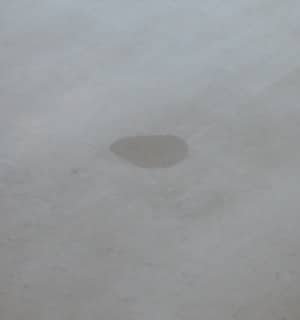Are Your Marble Tiles Properly Sealed?
Last Updated on May 23, 2025 by David
If you are disappointed with the marble sealer on your marble floors, don’t worry…
…you are not alone.
This advice about sealing marble will help you choose the right sealer for your marble floors
Don’t Put A Surface or Topical Sealer On Polished Marble
 This polished marble floor was sealed with a topical sealer. Topical sealers will not stick to a polished surface. So the floor looks awful.
This polished marble floor was sealed with a topical sealer. Topical sealers will not stick to a polished surface. So the floor looks awful.
The answer is to strip away residual sealer and then apply an impregnating sealer.
In most cases however, spots and stains on marble floors are not the result of the wrong or a bad sealer.
It is usually a result of not understanding the advantages and limitations of marble sealers.
That is assuming you have actually sealed your marble floor!
What a Marble Sealer Can Do
- Help stop water penetrating the surface
- Help stop oil penetrating the surface
- Make cleaning easier and more efficient
- Help prevent water and oil penetrating the grout
What A Marble Sealer Can Not Do
- Prevent a water stain penetrating into the stone if it is not wiped up.
- Prevent acid spills from breaking through the surface and dissolving the marble, causing dull etch marks
- Stop scratching from foot borne soil and grit
- Make the surface of the marble harder and more resistant to scratching

So Why Seal Your Marble Floor Tiles
Whilst marble is quite a dense stone, it is a porous natural stone. So oil and water spills will penetrate if they left on the surface. The porosity of marble is also significantly influenced by the finish.
Liquids will penetrate a matt honed finish more quickly than a highly polished marble.
So it is important for a marble floor to be sealed to preserve its appearance.
The kind of sealer you need depends on the finish of the marble and how you maintain your marble.
Sealing Polished Marble Floors
Polished marble should be sealed with a high penetration, impregnating sealer.
An impregnating sealers makes no difference to the look or finish on the marble.
Sealing Honed Marble Floors
You have a choice with honed marble. If you prefer to retain the flat matt appearance, then penetrating impregnating sealer is your ideal choice.
However if you prefer to have the option of applying a surface sealer. The surface sealer will affect the appearance, giving a light sheen.
If you want a shiny finish without the cost of diamond polishing your marble floor, you can have gloss sealer.
Whichever marble sealer you choose it is almost impossible to protect your marble against acid attack.
Protecting Marble Floors from Acid Etching
Marble and other calcium based stones like travertine and limestone and terrazzo are vulnerable to acid etching.
Unlike dose stones like granite, marble is instantly etched (dissolved) by any acidic substance it comes into contact with – vinegar, cola, lemon juice, wine, champagne, milk.
The best advice is don't spill anything on a marble floor.
If you do spill anything take immediate action
Clean up any spills on your marble floor.
If your floor has suffered light acid etching, you may be able to polish the etch marks to make them either disappear or hardly visible.
If your marble floor has severe acid etching then you may need to clean the marble, grind, hone and re-polish your marble to remove the acid etching completely.
Recent Posts:
We work throughout the country, just some of our work counties:
Copyright © Fabritec - Abbey Floor Care. Natural Stone Floor Restoration in Surrey and South West London FAQ - Privacy Policy - Terms And Conditions